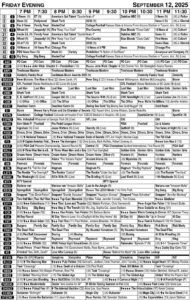To Your Good Health: Daughter pushes to cut gluten from diet
DEAR DR. ROACH: I am a reasonably healthy 81-year-old retired man, although I wear a pacemaker and have bad arthritis. My daughter insists that I’d be much healthier and happier if I eliminated gluten from my diet. I don’t even know what gluten is or which foods it’s in. So, am I flying blind into a storm about all this?
• Prof. G
ANSWER: Gluten is a protein found in cereal grains, specifically wheat (which has many types and names such as durham, semolina, spelt, farro and einkorn), rye, barley, triticale and sometimes oats. (Oats have no gluten but are often contaminated by being grown, processed or transported with a gluten-containing grain.)
Gluten contains a protein called gliadin, which causes some people to develop an immune reaction. It isn’t an allergy, but in people who are predisposed to this reaction, gluten can cause damage to the lining of the intestine and a wide variety of symptoms. Celiac disease is when a person has changes in the lining of the small bowel while consuming gluten, which then go away when a person is on a strict gluten-free diet.
Classical symptoms of celiac disease include abdominal pain, diarrhea, weight loss, distention and bloating. Some people have very mild symptoms, while others are very intense. When the damage to the intestine is severe, a person cannot absorb many nutrients well and can develop iron-deficiency anemia, folic acid or B12 deficiency with their attendant hematological and neurological symptoms, a specific skin disease (called dermatitis herpetiformis), metabolic bone disease and osteoporosis, and others. (Arthritis is not associated with celiac disease.)
In people with vague symptoms or those who don’t have a family history of celiac disease or other risk conditions, a simple blood test is adequate to make sure that the person doesn’t have celiac disease.
I have had patients go on a gluten-free diet and feel better without having had diagnostic testing for celiac. It’s possible that they had undiagnosed celiac disease, but a huge change in the diet can trigger a placebo response.
People with a nonceliac gluten sensitivity (NCGS) do not have celiac disease but do develop symptoms such as bloating or abdominal pain after eating gluten-containing foods.
For people without celiac disease or NCGS, changing your diet is not necessary and may not make you healthier or happier. Gluten is a healthy part of many diets.


